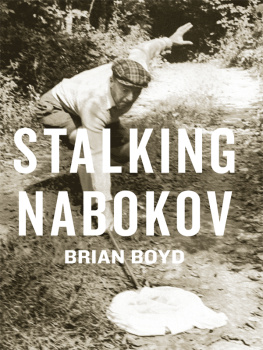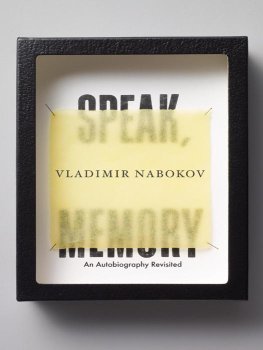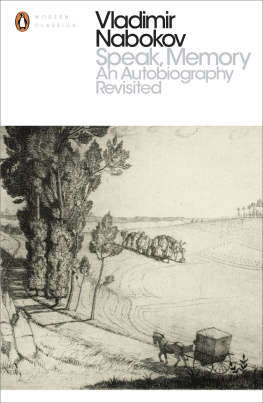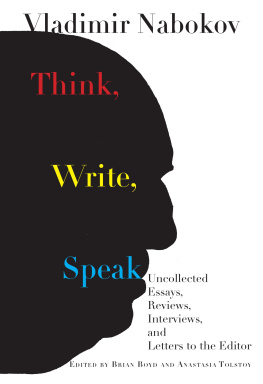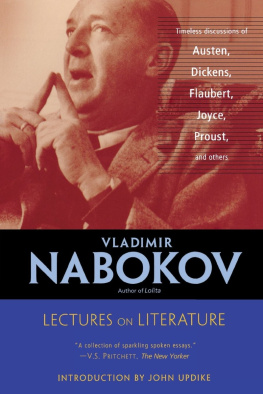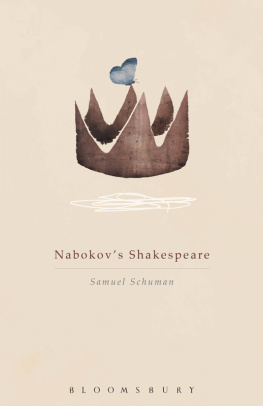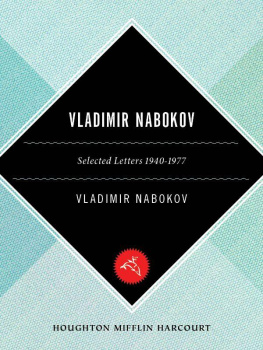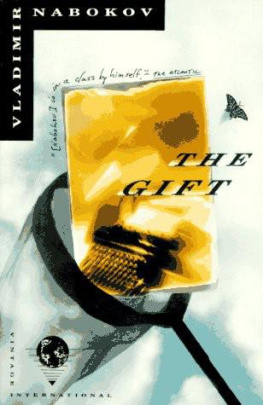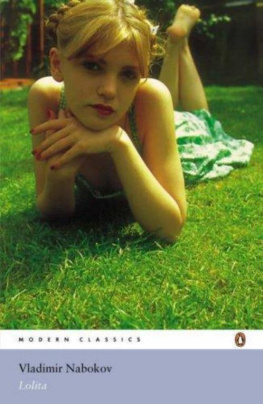Stalking Nabokov
Stalking Nabokov
SELECTED ESSAYS
Brian Boyd
Columbia University Press New York

Columbia University Press
Publishers Since 1893
New York Chichester, West Sussex
cup.columbia.edu
Copyright 2011 Columbia University Press
All rights reserved
E-ISBN 978-0-231-53029-3
Library of Congress Cataloging-in-Publication Data Boyd, Brian, 1952
Stalking Nabokov : selected essays / Brian Boyd.
p. cm.
Includes bibliographical references and index.
ISBN 978-0-231-15856-5 (cloth : acid-free paper)
ISBN 978-0-231-53029-3 (e-book)
1. Nabokov, Vladimar Vladimirovich, 18991977
Criticism and interpretation. I. Title.
PG3476.N3Z587 2011
813.54dc22 2011008348
A Columbia University Press E-book.
CUP would be pleased to hear about your reading experience with this e-book at .
To Bronwen
and to my friends in the Nabokov world
CONTENTS
I would like to thank the late Vladimir Nabokov for giving readers, and especially this reader, such pleasure, the late Vra Nabokov for inviting me to sort out her husbands archives and for trusting me enough to tolerate my researching his biography; and Dmitri Nabokov and the late Elena Sikorski for their support, hospitality, and friendship, and Dmitri also for permission to quote all unpublished Nabokov material.
I would like to thank the following writers, editors, publishers, colleagues, students, and friends for inviting me to contribute to conferences, journals, books, talks, or discussions, or for ideas or feedback, or for giving me permission to reproduce the material that follows: Martin Amis, Harold Augenbraum (then of Mercantile Library of New York), Andr Bernard (then of Harcourt), Marijeta Bozovic (then of Ulbandus), Matthew Brillinger, Lisa Browar (then of the New York Public Library), Patricia Carr Brckmann (Trinity College, University of Toronto), Linda Corman (Trinity College Library, University of Toronto), Mo Cohen (Gingko Press), Julian Connolly, Peter Craven (then of Scripsi), Galya Diment, Alexander Dolinin, Kristin Eliasberg (then of PEN Center, New York), George Gibian, Jane Grayson (then of SEES, University of London), R. S. Gwynn, Jean Holabird, Don Barton Johnson (including as editor of Nabokov Studies), Kurt Johnson, Frederic R. Karl (Bibliography and Source Studies), Zoran Kuzmanovich (including as editor of Nabokov Studies), Shoko Miura (Nabokov Society of Japan), Akiko Nakata (Nabokov Society of Japan), Fred Neubauer (Einhard Foundation), Will Norman, Mitsuyoshi Numano (Nabokov Society of Japan), Stephen Jan Parker (including as editor of The Nabokovian), Rodney Phillips (then of the New York Public Library), Robert Michael Pyle, Stanley J. Rabinowitz, Stanislas Shvabrin, Claudio Soares, Vadim Stark (then of the Institute of Russian Literature and Art, St. Petersburg), Mio Suda (Gunzo), Anthony Uhlmann (Australasian Association for Literature), Deanne Urmy (then of Beacon Press), Frdric Verger (La Revue des Deux Mondes), Olga Voronina (then of the Vladimir Nabokov Museum, St. Petersburg), Tadashi Wakashima (Nabokov Society of Japan), Duncan White, Robert Wilson (American Scholar), Dieter E. Zimmer, and Irene Zohrab (New Zealand Slavonic Journal). There are many other Nabokovian friends, including some of the most gifted, distinguished, and treasured, with whom I have exchanged ideas and information or from whom I have received invitations, whose names are not listed here only because space is finite and gratitude endless, and because I do not remember specific debts to them in any of these pieces. But for other debts, friendship, and common interests, you are certainly included in the dedication, after Bronwen, to whom I owe most.
Books by Vladimir Nabokov unless otherwise noted. For full bibliographical details, see the bibliography.
| Ada | Ada or Ardor: A Family Chronicle |
| BS | Bend Sinister |
| CE | Conclusive Evidence |
| DBDV | Dear Bunny, Dear Volodya: The Nabokov-Wilson Letters, 19401971 |
| EO | Alexander Pushkin, Eugene Onegin, trans. with commentary by Vladimir Nabokov |
| Gift | The Gift |
| IB | Invitation to a Beheading |
| KQK | King, Queen, Knave |
| LAS | Lolita: A Screenplay |
| LATH | Look at the Harlequins! |
| LDQ | Lectures on Don Quixote |
| LL | Lectures on Literature |
| Lolita | The Annotated Lolita, ed. Alfred Appel Jr. (1st ed., 1970) |
| LRL | Lectures on Russian Literature |
| MUSSR | The Man from the USSR and Other Plays |
| NAPC | Brian Boyd, Nabokovs Ada: The Place of Consciousness (2nd ed., 2001) |
| NG | Nikolay Gogol |
| NPFMAD | Brian Boyd, Nabokovs Pale Fire: The Magic of Artistic Discovery |
| NsBs | Nabokovs Butterflies |
| PF | Pale Fire |
| PP | Poems and Problems |
| RLSK | The Real Life of Sebastian Knight |
| SIC | The Song of Igors Campaign. |
| SL | Selected Letters, 19401977 |
| SM | Speak, Memory (1967) |
| SO | Strong Opinions |
| SoVN | Stories of Vladimir Nabokov |
| TT | Transparent Things |
| VNA | Vladimir Nabokov Archive, Henry W. and Albert A. Berg Collection, New York Public Library |
| VNAY | Brian Boyd, Vladimir Nabokov: The American Years |
| VNRY | Brian Boyd, Vladimir Nabokov: The Russian Years |
I was born two generations after Vladimir Nabokov. A butterfly location label in the Cornell Lepidoptera collection tells me that on the day of my birth, at Scout Creek near the altogether enchanting little town of Afton, Wyoming (SO 323), Nabokov stalked and caught a female of a butterfly of a new subspecies he had named three years earlier (Lycaeides argyrognomon longinus Nabokov 1949).
In high school, long before I became Dr. Boyd, I began reading Nabokov so intensely that his way of seeing the world partly shaped mine. I started a doctoral dissertation on his work while he was still alive, but to my shock and consternation learned that he was not time-proof and that I would be writing most of it after his death. For Vra Nabokov I catalogued the paper pile he had left behind in Montreux, Switzerland, and for his biography I followed his trail across Russia, England, Western Europe, and America. Since completing the biography I have explored new fields, but Nabokov keeps pulling me back. By now I have published a pile of my own on him, some of it well known, some not. When recently I had reason to consult one of my less well-known efforts, I decided others might like to see this stuff.
Lately literary critics and scholars tend to avoid a single-author focus, partly because authors have been downgraded as the causes of literary works. Thats a mistake, I think:, Nabokov, Pushkin, Shakespeare: Genius, Generosity, and Gratitude in The Gift and Pale Fire).
The best criticism, too, is highly individual but also part of highly social processes, and thats another thread that runs through these pieces. Criticism is cooperative: we want to understand the same works, and we learn from others both specific information and ways of understanding and appreciating. And it is competitive: we want to challenge others whose claims we find wrong, and we want
Next page
